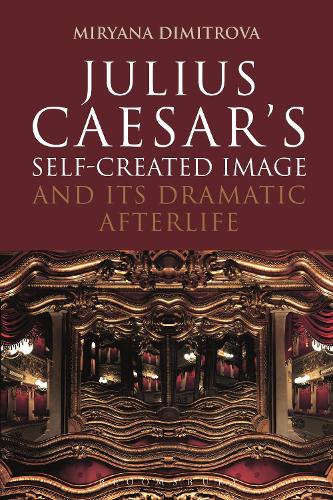
Julius Caesar's Self-Created Image and Its Dramatic Afterlife
(Hardback)
Publishing Details
Julius Caesar's Self-Created Image and Its Dramatic Afterlife
By (Author) Dr Miryana Dimitrova
Bloomsbury Publishing PLC
Bloomsbury Academic
14th December 2017
United Kingdom
Classifications
Tertiary Education
Non Fiction
Plays, playscripts, drama
European history: the Romans
Ancient history
Literary studies: plays and playwrights
937.05092
Physical Properties
Hardback
256
Width 156mm, Height 234mm
526g
Description
The book explores the extent to which aspects of Julius Caesars self-representation in his commentaries, constituent themes and characterization have been appropriated or contested across the English dramatic canon from the late 1500s until the end of the 19th century. Caesar, in his own words, constructs his image as a supreme commander characterised by exceptional celerity and mercifulness; he is also defined by the heightened sense of self-dramatization achieved by the self-referential use of the third person and emerges as a quasi-divine hero inhabiting a literary-historical reality. Channelled through Lucans epic Bellum Civile and ancient historiography, these Caesarean qualities reach drama and take the shape of ambivalent hubris, political role-playing, self-institutionalization, and an exceptional relationship with temporality. Focusing on major dramatic texts with rich performance history, such as Shakespeares Julius Caesar, Handels opera Giulio Cesare in Egitto and Bernard Shaws Caesar and Cleopatra but also a number of lesser known early modern plays, the book encompasses different levels of dramas active engagement with the process of reception of Caesars iconic and controversial personality.
Reviews
The strengths of this book lie especially in the authors impressive familiarity with her large number of texts, both from antiquity and later periods, and in her close readings Dimitrova is a skilled reader who presents an impressive insight into both the scholarly literature on the subjects treated as well as a high degree of familiarity with both her ancient sources and the nine dramas. * Bryn Mawr Classical Review *
A pioneering study transcending boundaries between Classics, Theatre and Literary Studies. In elegant dissections of Julius Caesars representations from the Renaissance to Shaw, Dimitrova creates an original argument about a staple figure of the global stage. * Edith Hall, Professor of Classics, King's College London, UK *
This study of the cultural reception of the personality of Julius Caesar in theatre and opera begins with an analysis of Caesars promotion of his own achievements in his Commentaries which are a fusion of propaganda and self-promotion. Dimitrova offers rich and insightful readings of the reception of Caesars own self-representation in Shakespeare, Handel, Shaw and others. Her excellent study offers new ways of perceiving Caesars own text as well as enriching our understanding of theatrical, operatic, and cinematic depictions of the famous Roman general. This is reception studies at its best. * Margaret Malamud, Professor of History, New Mexico State University, USA *
Miryana Dimitrovas well-researched, well-organised and highly accessible study of the relationship between Julius Caesars self-representation in his Commentaries, less flattering representation by Roman historians, such as Lucan, and subsequent appropriation by English dramatists, offers the reader and researcher a fascinating insight into the dramatic mediation of iconicity. Her treatment of the themes of Caesarian self-justification and self-memorialization - as reflected in the ambivalent characteristics of his pragmatic clemency, his legendary celerity, as well as his hubris and political manipulation and his central role in the decline of Roman Republicanism - is both compelling and original. A spectrum of dramatic authors and composers, from Shakespeare, Chapman, Fletcher and Massinger, to G.F. Handel and, in the 20th century, George Bernard Shaw all of whose plays have contributed significantly to the Caesarian myth and demigod status is adduced to explain the relationship between synchronic autobiographical record and diachronic image-fashioning across languages and cultures. * Michael Ingham, Professor of English, Lingnan University, Hong Kong *
Author Bio
Miryana Dimitrova is an independent researcher with a PhD in the reception of classical literature from Kings College, London, UK.
